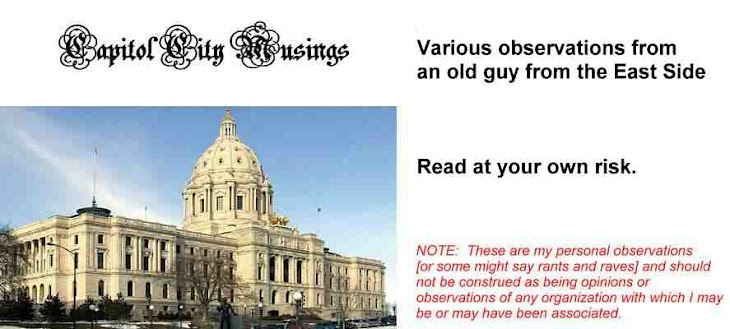Another truth about Transit that I did not mention in earlier posts.
Transit people believe the stuff they say, that they have a kind of civic morality which justifies any amount of civic iniquity. They believe in the rightness of their cause and their own personal goodness that things like whether right or wrong is done to others do not bother them.
About a dozen years or so ago, these wonderful people who give us our metropolitan transit service conducted a survey about how to make the busses run faster.
 After spending a bunch of public dollars the Transit people were given a conclusion which I don’t have the exact word for but which can be reasonably paraphrased as, “Busses will make better time if they don’t have to stop to pick up or drop off passengers.”
After spending a bunch of public dollars the Transit people were given a conclusion which I don’t have the exact word for but which can be reasonably paraphrased as, “Busses will make better time if they don’t have to stop to pick up or drop off passengers.”
You can picture the Metropolitan Council execs slapping their foreheads in amazement. Who would have ever thunk it?
Well, now they’re telling us that to have the University Avenue light rail stop at half-mile intervals instead of one mile intervals will make the train take too long, be too expensive, and reduce ridership. It beats me how a train that doesn’t stop and pick up people can have more riders than one which does, but leave the wonks [who, of course won’t be riding the thing themselves or trying to run businesses on University Avenue, or sleep in a house on Sherburne or Aurora] to come up with some kind of explanation.
University Avenue is under attack and all that our city, county, and state leaders seem to be able or willing to do is to discuss how to carry that attack out. Light rail [also known as street cars without stops] isn’t the only thing attacking the Avenue, but it is one of the biggest and it is one where the role of the state is most evident.
University Avenue is a street. Streets are indeed part of a public transportation system, created to move people and things to and from the private properties which adjoin them or to other streets which do the same thing. Historically, University Avenue has seen horses, locomobiles, street cars, cars, trucks, bicycles, and trucks. It will continue to see most of these later uses even after light rail is built, if it ever happens.
People have bought or rented property along University Avenue to operate business or to live or bought property near University Avenue in Frogtown, Aurora-St. Anthony, Midway, and other places because its proximity of the Avenue brings them commerce or allows them conveniently move about.
The businesses along the Avenue need the traffic lanes and parking the Avenue provides. The Powers That Be seem intent on removing most of this so that people who operate trains can operate trains. They say that this is progress and that in the long run properties along the Avenue will have a greater aggregate value
They fail to consider that an aggregate increase of value does not mean that anything good will happen for the owner of a specific property, that whatever increases in property value do develop are probably going to happen around the stops, because that is where people will be able to get without having to find the elusive parking place.
However, it seems that most of this increase of property value will do nothing for property values and therefore property taxes. Construction, both old and new doesn’t line up with the stops. The Capitol complex doesn’t pay taxes. Rondo Library doesn’t pay taxes. The Wilder Foundation will be occupying a good chunk of Lexington.
I haven’t supported this boondoggle. Previous posts reflect that. [link, link.
So it makes sense that if we can only have stops at one-mile intervals that we move the stops. We don’t need a stop by the Capitol. It’s not going to be taken down anytime soon.
So I have this idea which I haven’t seen posted anyplace: Let’s put the stops at Western, Victoria, Hamline, and Fairview. Let the economy move things there. Target [a company which I personally do not patronize for personal reasons but which is a large Minnesota-based enterprise] recently jumped through a whole lot of hoops to build a new store at Hamline. Probably some of these hoops could have been lessened if there were to be an exit at Hamline. Think of what could happen at Victoria or Western. Perhaps some of the small business there might be able to survive or at least be able to receive just compensation from somebody else who could use the opportunity instead of being left to wither like the present plan calls for.
Of course, if they really wanted to get people between the downtowns they would have chosen a different path and left University Avenue to do what it always has done. Alongside the Great Northern [which really should have been the path for I-94] or somehow along the present I-94 would have made more sense.
 Tonight is New Year’s Eve and tomorrow will begin 2008. Local media have been full of end-of-year retrospectives. I know that they do this between the December 25th holiday and the end of the year because that is a slow time of the year. January usually brings Congress, state legislatures, and city councils back into operation, often with new personnel and leaders, and new Presidents, governors, and mayors into office around the
Tonight is New Year’s Eve and tomorrow will begin 2008. Local media have been full of end-of-year retrospectives. I know that they do this between the December 25th holiday and the end of the year because that is a slow time of the year. January usually brings Congress, state legislatures, and city councils back into operation, often with new personnel and leaders, and new Presidents, governors, and mayors into office around the 



















































